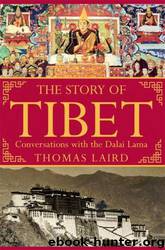The Story of Tibet: Conversations with the Dalai Lama by Thomas Laird

Author:Thomas Laird
Language: eng
Format: mobi
Publisher: thamel
Published: 2010-11-25T19:52:28.979000+00:00
With the Convention Between Great Britain and China Respecting Tibet, Britain implied that the Manchu Empire was not a foreign state in relation to Tibet but did not say that Tibet was part of the empire. Britain had mentioned none of this in its 1904 treaty with Tibet, nor did London or the Manchus inform Lhasa of the 1906 agreement, between two foreign powers, about its fate. With the Manchus on board, and the start of a deal to protect Britain's interests in India in hand, London turned to Russia in 1907 and signed the second treaty, in which the two states agreed to recognize "the principle of the suzerainty of China over Thibet." Perhaps for the first time, the ancient relations between the Manchu and the Tibetans were defined by a European word and concept. By now, English documents commonly conflated the Qing Empire with China, though Manchu documents never made this mistake. Through its treaties with the Manchus and Russia, Britain granted rights to the Manchu Empire over Tibet that the Qing had never had. It was a huge victory for the empire, because the Western powers had dismissed Qing claims of sovereignty, stemming from its ancient tributary relationship with all its neighbors, in every other case. With this document in hand, the Manchu had become Tibet's "suzerain"-which, according to European legal precedent, meant that Tibet was, at least nominally, not fully independent. Neither the Thirteenth Dalai Lama nor the Tibetans were party to these developments. Under European legal precedent, the status of a state cannot be changed unless it is a party to the agreement. Thus it was impossible for the treaties between China, Russia, and Britain to alter Tibet's status.
In the first decade of the twentieth century, British documents began to equate China with all the territory held by the Manchu Empire. At the same time, the Chinese in the Qing Empire, as they started to think what a Chinese nation would be once the Manchu were overthrown, grew increasingly concerned that the ring of ancient tributary nations around the Middle Kingdom were being colonized or absorbed into European or Japanese spheres of influence. The Chinese conflated the Manchu Empire with what they felt their sense of China was, even though they had never ruled more than half the territory the Manchus had conquered. The Chinese obsession with the idea that foreign provocateurs-aided by Manchu imperialists-were tearing China apart encouraged a virulent sense of aggrieved nationalism, which persists today
China is deeply suspicious of any foreign involvement in its affairs, no doubt because of its belief that European and other powers had lied about its history to justify their nineteenth- and twentieth-century colonialist exploits. Chinese today remain angry that foreign imperialists stripped China of what, in their eyes, belonged to China. Ironically, the Great Game imperial Britain and Russia played over Tibet ended with the recognition, by each country, of the Qing Empire's nominal rights over Tibet.
Download
This site does not store any files on its server. We only index and link to content provided by other sites. Please contact the content providers to delete copyright contents if any and email us, we'll remove relevant links or contents immediately.
The Way of Zen by Alan W. Watts(6574)
Ego Is the Enemy by Ryan Holiday(5389)
The Art of Happiness by The Dalai Lama(4114)
The Book of Joy by Dalai Lama(3958)
Why Buddhism is True by Robert Wright(3434)
Spark Joy by Marie Kondo(3284)
Shift into Freedom by Loch Kelly(3179)
Happiness by Matthieu Ricard(3030)
A Monk's Guide to a Clean House and Mind by Shoukei Matsumoto(2895)
The Lost Art of Good Conversation by Sakyong Mipham(2633)
The Meaning of the Library by unknow(2550)
The Unfettered Mind: Writings from a Zen Master to a Master Swordsman by Takuan Soho(2287)
The Third Eye by T. Lobsang Rampa(2247)
Anthology by T J(2194)
Red Shambhala by Andrei Znamenski(2175)
The Diamond Cutter by Geshe Michael Roach(2052)
Thoughts Without A Thinker: Psychotherapy from a Buddhist Perspective by Epstein Mark(2000)
Twilight of Idols and Anti-Christ by Friedrich Nietzsche(1882)
Advice Not Given by Mark Epstein(1869)
